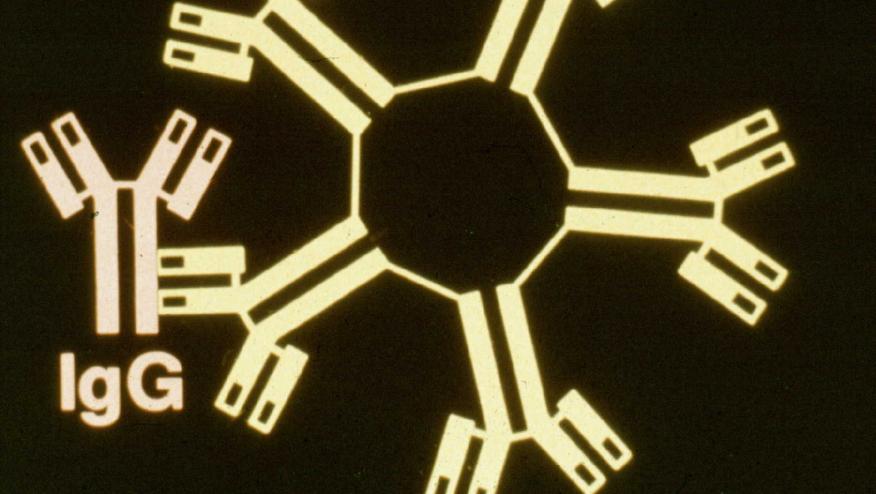Autoantibodies Don't Disappear With Remission in RA Save

Immunologic remission in rheumatoid arthritis (RA), defined as the disappearance of anti-citrullinated protein antibodies (ACPA) and rheumatoid factor (RF), was seen infrequently among patients achieving sustained clinical remission and did not correlate with the disappearance of symptoms, a long-term Dutch study found.
Among RA patients who were ACPA positive and achieved sustained remission after cessation of disease-modifying antirheumatic drugs (DMARDs), only 13% became ACPA negative, as did 8% of those who had a late disease flare more than 1 year after DMARD withdrawal and 6% of those who never reached DMARD-free remission, which was not a statistically significant difference (P=0.63), according to Debbie M. Boeters, MD, and colleagues from Leiden University Medical Center in Leiden.
A similar pattern was seen for RF, with 20% of patients in sustained DMARD-free remission having seroconverted, compared with 6% of patients with a late flare and 15% of those with persistent disease (P=0.44), the researchers reported online in Annals of the Rheumatic Diseases.
Sustained DMARD-free remission -- with an absence of synovitis, resolution of morning stiffness, and normalization of fatigue and function -- is currently considered the optimal outcome in RA. This has been reported more commonly among patients who are seronegative, and who usually have milder disease.
For seropositive patients, however, whether the underlying immunologic disturbance characterized by the presence of autoantibodies normalizes with clinical remission is uncertain. "It was recently suggested that disappearance of autoantibodies is a hallmark of immunological remission and might characterize patients who are able to achieve drug-free remission," the researchers wrote.
To examine this possibility and to determine whether this immunological remission could serve as a stringent long-term treatment goal, Boeters and colleagues reviewed data from 1,586 patients enrolled in the Leiden Early Arthritis Clinic cohort from 1993 to 2014, 941 of whom were ACPA- or RA-positive at baseline. Measurements included levels of anti-cyclic citrullinated peptide 2 (anti-CCP2), IgG, and IgM as well as RF IgM.
Sustained remission required patients to have remained symptom-free for at least a year after withdrawal of all DMARDs and for the duration of follow-up. A total of 95 of the 941 patients were in sustained DMARD-free remission after a median of 4.8 years, and were subsequently followed for an additional 4.2 years, remaining drug-free throughout.
The analysis also included that 21 patients had initially achieved DMARD-free remission for at least 1 year but subsequently flared after a median of 2.2 years, and 45 who had persistent disease and had been unable to stop treatment. Median follow-up of the entire study group was 10 years.
Although actual seroconversion was uncommon, those who became seronegative had lower levels of anti-CCP2 IgG at disease onset (42 vs 420 AU/mL, P<0.001) and also had lower levels of RF IgM (19 vs 53 IU/mL, P=0.003).
Measurement of anti-CCP2 IgM was done in addition to anti-CCP2 IgG because the IgM marker more specifically reflects ongoing immune activity. Seroconversion for IgM did not occur more often among patients who achieved sustained remission than in those who flared or never achieved remission. The finding of persistent anti-CCP2 IgM was an interesting outcome, according to the authors. "This suggests that even in patients who are clinically cured, the anti-CCP response is persistently activated," they wrote.
Discrepant results were seen for changes in autoantibody levels over time and sustained remission. No association was seen for changes per year in levels of ACPA, but for RF, each 10-unit decrease was associated with a 16% increase in the rate of sustained remission.
"Thus, seropositive RA patients who achieved sustained DMARD-free remission did not have disappearance of autoantibodies; however, there was a significant decrease of RF IgM levels in patients who achieved sustained DMARD-free remission compared with patients who did not," the researchers observed.
In sensitivity analyses, seroconversion rates did not differ among patients with shorter symptom duration (less than 12 weeks) before treatment initiation and among those who had longer follow-up (more than 4.2 years), and also when different cutoff levels for RF positivity were used.
The precise role of ACPA in RA development remains incompletely explained. "It is not yet elucidated whether ACPA plays a role in the pathophysiology or act as bystander, [but] the present data suggest that the ACPA response does not explain the maintained resolution of clinical disease," they noted.
They concluded that seroconversion of ACPA should not be considered a suitable treatment target in RA, adding that current research is considering whether other immune markers might be better predictors of sustained remission.
A strength of the study was its long duration, while limitations included changes in treatment over time and some loss to follow-up.
The study was funded by the European Research Council, the Dutch Arthritis Foundation, and the Innovative Medicines Initiative 2 Joint Undertaking.










If you are a health practitioner, you may Login/Register to comment.
Due to the nature of these comment forums, only health practitioners are allowed to comment at this time.